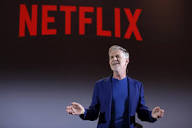Netflix: The Streaming Giant That Revolutionized Entertainment
.

Netflix, a name synonymous with binge-watching and high-quality content, has become an integral part of modern entertainment. From its humble beginnings as a DVD rental service in 1997 to becoming a global streaming powerhouse, Netflix has redefined how people consume media. This article explores the history, growth, business model, and cultural impact of Netflix while examining its future in an ever-evolving digital landscape.
The Humble Beginnings of Netflix
Netflix was founded in 1997 by Reed Hastings and Marc Randolph in Scotts Valley, California. The company started as a DVD rental service, allowing customers to rent movies online and receive them via mail. The idea was revolutionary at the time, offering a convenient alternative to brick-and-mortar rental stores like Blockbuster.
The Turning Point
In 2000, Netflix introduced a subscription-based model, allowing customers unlimited DVD rentals for a fixed monthly fee. This business model became a significant success, setting Netflix apart from competitors. By 2007, Netflix mailed out its billionth DVD, solidifying its position as a leader in home entertainment.
The Birth of Streaming
2007 marked a pivotal year for Netflix with the launch of its streaming service. This innovation allowed subscribers to watch movies and TV shows online without waiting for physical DVDs. The move to streaming aligned perfectly with the rise of high-speed internet and the growing demand for on-demand entertainment.
The End of DVDs?
While Netflix’s DVD rental service still exists today, its focus shifted entirely to streaming as the company realized the enormous potential of digital content delivery.
Original Content: A Game-Changer

In 2013, Netflix entered the realm of original programming with the critically acclaimed series "House of Cards." This marked the beginning of Netflix’s transformation from a content distributor to a content creator.
Other Landmark Originals
"Orange Is the New Black" (2013): A trailblazer for diverse storytelling.
"Stranger Things" (2016): A global phenomenon blending nostalgia with sci-fi.
"The Crown" (2016): A lavish historical drama showcasing Netflix’s commitment to quality.
Original content not only attracted new subscribers but also established Netflix as a legitimate competitor to traditional TV networks and movie studios.
The Global Expansion
Netflix's global expansion began in earnest in 2010, starting with Canada, followed by Latin America and Europe. By 2016, Netflix was available in over 190 countries, making it a truly global brand.
Localized Content
To cater to diverse audiences, Netflix invested heavily in producing localized content. Hits like Spain’s "Money Heist" (La Casa de Papel), South Korea’s "Squid Game", and India’s "Sacred Games" demonstrated the universal appeal of well-crafted stories.
Multilingual Accessibility
Netflix also supports multiple languages for subtitles and dubbing, further broadening its reach.
Business Model and Revenue Stream
Netflix operates on a subscription-based model, offering various pricing tiers to suit different needs. Its revenue streams primarily come from:
1. Subscription Fees: Netflix boasts over 247 million subscribers as of 2024.
2. Licensing Agreements: While focusing on originals, Netflix also licenses popular movies and TV shows to keep its library diverse.
3. Merchandising: Netflix has ventured into selling merchandise for its hit shows, such as clothing and collectibles.
Challenges and Competitors
The Streaming Wars
As Netflix grew, competitors like Amazon Prime Video, Disney+, HBO Max, and Apple TV+ entered the streaming market. Each platform brought unique offerings, challenging Netflix’s dominance.
Content Saturation
The abundance of streaming options has led to "subscription fatigue," where consumers hesitate to pay for multiple services.
Rising Costs
Producing high-quality original content is expensive. Netflix spends billions annually on content creation, which has led to questions about sustainability.
Cultural Impact
Netflix has had a profound impact on global culture, influencing how people watch and interact with media.
Binge-Watching
Netflix popularized binge-watching by releasing entire seasons of shows at once. This changed how audiences consumed TV series, making weekend-long viewing marathons a norm.
Breaking Barriers
Netflix has championed diversity and inclusion by giving platforms to underrepresented voices. Shows like "Dear White People" and "Sex Education" tackle social issues with sensitivity and authenticity.
Global Storytelling
By investing in international content, Netflix has bridged cultural gaps, introducing viewers to stories from different parts of the world.
Technological Innovations
Netflix has always been at the forefront of technological advancements.
Recommendation Algorithm
Netflix’s algorithm analyzes user behavior to provide personalized recommendations, enhancing the user experience.
Offline Viewing
In 2016, Netflix introduced offline downloads, allowing users to watch content without an internet connection.
Interactive Content
With projects like "Black Mirror: Bandersnatch," Netflix has experimented with interactive storytelling, giving viewers control over the narrative.
.

Criticism and Controversies
Like any major corporation, Netflix has faced its share of criticism.
1. Content Removal: The rotation of licensed content often frustrates subscribers when their favorite shows are removed.
2. Price Hikes: Periodic increases in subscription fees have sparked complaints.
3. Ethical Concerns: Netflix has faced backlash over controversial content, such as the release of "Cuties" (2020), which was accused of inappropriate themes.
The Future of Netflix
Despite challenges, Netflix shows no signs of slowing down. The company continues to innovate and adapt to changing consumer behaviors.
Gaming
Netflix has ventured into the gaming industry, offering interactive games based on its popular franchises.
Live Events
To diversify its offerings, Netflix has begun experimenting with live streaming events, such as stand-up comedy specials and award ceremonies.
Sustainability
Netflix is also committed to reducing its carbon footprint, aiming to become a leader in sustainable streaming.
Conclusion
From renting DVDs to dominating the global streaming market, Netflix’s journey is a testament to the power of innovation and adaptability. Its impact on the entertainment industry is unparalleled, setting new standards for storytelling, technology, and consumer engagement.
As Netflix continues to expand and experiment, its story serves as an inspiration for businesses and creators worldwide. The streaming giant has not only entertained millions but also redefined what it means to connect through storytelling in the digital age.

.jpg)
.jpg)
.jpg)
0 komentar:
Posting Komentar